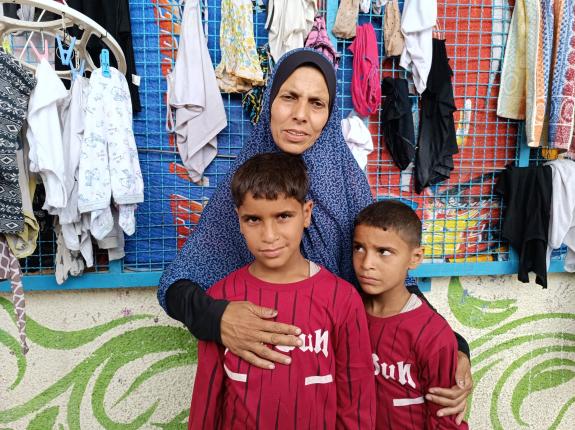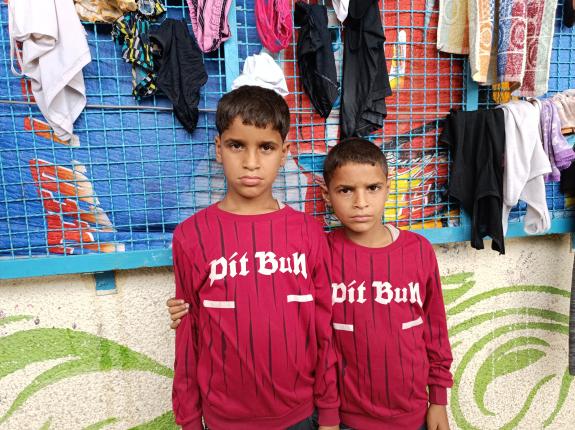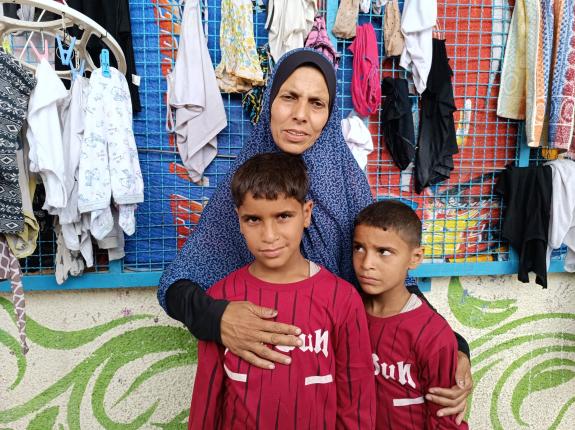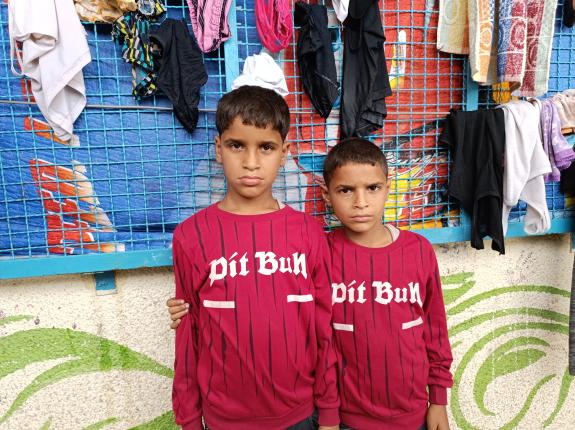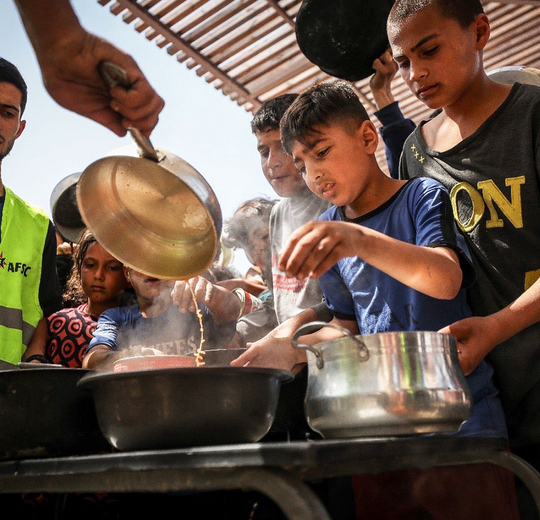My name is Nasreen Naeem Al-Hilu, and I am 47 years old, from Gaza City. My dream is for the war to end, to return to my home and rebuild it again, and for my Lord to grant me the strength to raise my orphaned grandchildren, educate them well, and protect them as they are the trust of my martyred sons.
My story begins on the first day of the Israeli war on the Gaza Strip.
My name is Nasreen Naeem Al-Hilu, and I am 47 years old, from Gaza City. I have been living in tents for displaced people since the second day of the war. Occupation forces bombed our neighbour’s house, destroying their home and my family’s home along with it.
The residents of our neighbourhood evacuated the area. I went to my son Haitham Ziad Al-Hilu’s house, located in the Sabra neighbourhood south of Gaza City. We stayed there for a month, but as the bombing intensified, we fled. The house was completely bombed, and my son Mohammed, 27 years old, was martyred. He was extracted with great difficulty from under the rubble.
The occupation forces intensified their indiscriminate bombing of Gaza City, targeting residential neighbourhoods and destroying them. After the bombing of my son Haitham’s house and the martyrdom of my son Mohammed, we decided to flee to the southern valley areas, which the occupation forces declared as safe zones. We headed to Khan Younis.
We walked on foot, accompanied by children, women, and elderly people, for several kilometres. The occupation forces had divided the Gaza Strip into two parts and designated Salah al-Din Street as the street for civilians to use to exit. We walked amidst tanks, shelling, and heavy gunfire until we reached Sheikh Jabr School in Khan Younis, in the south of the Gaza Strip. The school was filled with thousands of displaced people seeking safety from the Israeli bombing.
We stayed at Sheikh Jabr School for three months. The school administration provided us with one meal a day, and we struggled greatly to provide bread and food for our children. My children and grandchildren cried incessantly from hunger, but we couldn’t find anything to feed them. All the money we had ran out, and food aid was very scarce.
My disabled son, Yazan Ziad Al-Hilu, fled with us. He has been disabled since birth due to an oxygen and potassium deficiency. My son Saheer, passed away shortly before the war due to a lack of immunity and being afflicted with muscular dystrophy.
My disabled son Yazan has been admitted to Nasser Hospital six times due to his deteriorating health, caused by the poor environment in the shelters. His condition has worsened due to inhaling smoke from the fire we used for cooking. Now, after several days, his condition has deteriorated significantly, as his body is struggling to tolerate the poor health, environmental, and nutritional conditions we have been living in since the first day of the Israeli occupation’s war on the Gaza Strip.
Currently, I am taking care of my son Yazan, who needs special food. He needs meat and chicken to strengthen his body and resist disease, as he was accustomed to before the war. However, I can’t find the appropriate food for him, and Yazan’s health is deteriorating significantly every day. I fear losing my second son due to the occupation’s unjust policies against us. These policies slowly and deliberately kill the people of Gaza.
My son Haitham and his two children, Ziad and Saheer fled with us to Khan Younis. Haitham’s elder son, Ziad, is 11 years old, and his younger son, Saheer, is ten years old. Haitham divorced and remarried before the war.
When the occupation forces besieged the area where we had taken refuge in the shelters, they demanded through loudspeakers that we leave the school. They managed to evacuate my disabled son, but we couldn’t leave, so we remained in the school amidst shelling, destruction, and heavy gunfire.
My son Haitham left the school with two other displaced people to get some food and water for us. We were living under siege inside the school and ran out of food and drink. After they left the school, an occupation tank shelled them, martyring my son Haitham and two other young men instantly on 3 February 2024.
Haitham left before noon, and I lost him between afternoon and sunset. I went out searching for him and found him lying on the ground, being eaten by cats. I couldn’t bury him on the first day of his martyrdom due to Israeli shelling. On the second day, a group of displaced people went out with me, and we brought him back. The shelling had separated my son’s head from his body, and I buried him in the cemetery of Khan Younis.
After burying my son Haitham, my husband, my disabled son, my two orphaned grandchildren, and I went to the Ja’ouni UNRWA school-turned-shelter in the Nuseirat refugee camp. Nuseirat camp has become a haven for thousands of displaced people. The harsh journey of displacement worsened my husband’s health condition; he suffers from heart attacks, high blood pressure, and diabetes, and he has a blood clot in his foot.
My son Haitham’s martyrdom left me with his two children. My son Mohammed was also martyred, leaving me with his two daughters, Nasreen, one-and-a-half years old, and Celine, three months old. My granddaughter Celine was born in extremely difficult conditions during the war, enduring hardships during our displacement journey which has continued for almost eight consecutive months.
Celine suffers from malnutrition due to the lack of proper nutrition for her and her mother. We try to provide some milk for her, but there is no milk in Gaza, and we struggle to find even a little. We also face difficulty in providing diapers for the baby. Poor child! She was born in war and has lived through difficult conditions, yet she continues to fight for survival.
Also living with me is my disabled son Yazan, 13 years old, and my daughter Hanadi, who is married to Mohammed Sabehi. My daughters Rawida and Dina also live with me. Rawida’s husband, Ramy Shaheiber, was martyred in a bombing in Gaza City. My sick husband also lives with us, along with several of our displaced relatives. The war has imposed difficult living conditions on all of us, conditions we never expected to experience.
My son Haitham worked in the field of automotive electricity, but he lost his job during the war and then lost his life. The war deprived me of him, his brother Mohammed, my daughter’s husband Ramy, and many of my relatives who were killed by the Israeli war machine without mercy or compassion.
We live in shelters under difficult living conditions, without any money. The children need food and drink, and we struggle to provide even a little. There is no work in Gaza, and we have no means to sustain ourselves. We lost our home to the occupation forces’ shelling, and I lost my sons. I try to take care of the orphaned children, who are a trust to me.
We live in great hardship in the school-turned-shelter. We have no drinking water, no water for washing clothes or using in the bathroom. We have no comfort at all, and we have no privacy inside the school. The men live in tents in the school yard, while women and children sleep collectively in classrooms.
We haven’t sat at one table as a family since the beginning of the war. We lost all the atmosphere of Ramadan; we didn’t feel the coming or ending of Ramadan at all. We didn’t feel the joy of Eid. We suffer from poor hygiene due to water shortages and a severe shortage of clothes. It’s hard for me to ask for help from anyone. We used to live a decent life, and now we rely on aid.
The children long for fruits and meat, but we don’t have the money to buy them. Also, prices have skyrocketed during this war, more than ten times their pre-war prices. Often, my orphaned grandchildren go to sleep without having dinner. I walk long distances every day to search for bread and some food, but I can’t find any. My sons used to own a car repair workshop, but now we suffer greatly, like all the displaced people, during the war.
My martyred son Haitham used to take care of all our affairs because of his father’s illness, and after his martyrdom, we have lost our primary support. After all of this, we trust that Allah will not forsake us, He will not abandon us, he will grant us victory over the occupation, and all the injustice we face will disappear. I know that the pain will remain in our hearts as long as we live, but my dream now is for the war to end, to return to my home and rebuild it again, and for my Lord to grant me the strength to raise my orphaned grandchildren, educate them well, and protect them as they are the trust of my martyred sons.
Take action now
Tell Congress to demand lifesaving aid for Gaza
The humanitarian crisis in Gaza has reached catastrophic levels. Since March 2, 2025, Israel—with full support from the U.S.—has severely restricted food, water, medicine, and humanitarian aid from entering Gaza.
Contact
If you have questions or concerns, please contact us at gazaunlocked@afsc.org.


